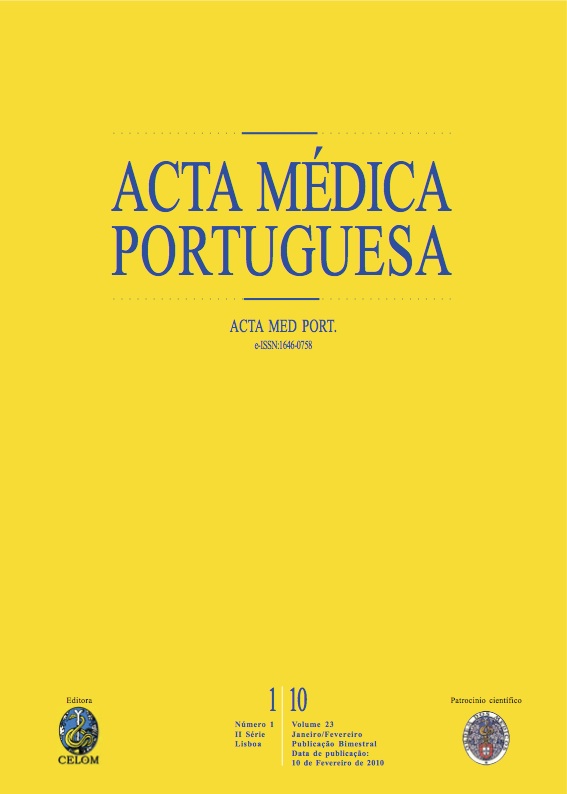Carcinoma gástrico e gastrite crónica: regulação epigenética por metilação dos genes CDH1 (Caderina-E), CDKN2A (p16INK4A), PTGS2 (COX2) e EGFR.
DOI:
https://doi.org/10.20344/amp.600Resumo
The genetic and epigenetic alterations are being studied as one of the causes of gastric cancer (GC) progression and development. DNA methylation is an epigenetic alteration which leads to suppressor gene silencing and proto-oncogene activation, playing an important role in carcinogenesis. The histological types of gastric carcinoma have different genetic paths and the knowledge of the molecular bases of tumoral progression leads to diagnostic accuracy and attempted therapy. CDH1 (E-cadherin) and CDKN2A (p16(INK4A)) genes are thought to be tumoral suppressor genes and PTGS2 (COX-2) and genes are involved in tumour regulation and growth. In one hand, gene silencing as an epigenetic phenomenon, and in the other hand, gene expression enhancement due to possible demethylation, simultaneously, can facilitate carcinogénesis and tumoral progression. Our aim was to relate CDH1, p16(INK4A), COX-2 and EGFR genes DNA methylation with the several histological types of gastric carcinoma and chronic gastritis. We studied 55 formalin fixed paraffin embedded gastric biopsies: 35 were GC specimens (12 diffuse type, 15 intestinal type and 8 indeterminate type, according to Laurén's classification) and 20 samples had chronic gastritis (CG). The DNA was treated with sodium bisulfite after extraction and then performed Methylation Specific PCR (MSP). Statistical analysis was based on chi-square test and Exact Fisher's test. CpG island methylation was detected in 94% of the GC samples for CDH1, 91% for COX-2, 80% for p16(INK4A) and no methylation was detected in EGFR gene (0%). In CG, CpG island methylation was found in 100% for CDH1 and COX-2 genes, 90% for p16(INK4A) and 20% for EGFR. These results reveal significant differences in EGFR gene methylation distinguishing GC from CG (p < 0, 01), suggesting that gene demethylation leads to malignant transformation and favours the use of tyrosine-kinase inhibitors in its treatment. Genes COX2 e p16INK4A lower methylation in intestinal and diffuse types of GC, favours their different role in respective histogenesis.Downloads
Downloads
Como Citar
Edição
Secção
Licença
Todos os artigos publicados na AMP são de acesso aberto e cumprem os requisitos das agências de financiamento ou instituições académicas. Relativamente à utilização por terceiros a AMP rege-se pelos termos da licença Creative Commons ‘Atribuição – Uso Não-Comercial – (CC-BY-NC)’.
É da responsabilidade do autor obter permissão para reproduzir figuras, tabelas, etc., de outras publicações. Após a aceitação de um artigo, os autores serão convidados a preencher uma “Declaração de Responsabilidade Autoral e Partilha de Direitos de Autor “(http://www.actamedicaportuguesa.com/info/AMP-NormasPublicacao.pdf) e a “Declaração de Potenciais Conflitos de Interesse” (http://www.icmje.org/conflicts-of-interest) do ICMJE. Será enviado um e-mail ao autor correspondente, confirmando a receção do manuscrito.
Após a publicação, os autores ficam autorizados a disponibilizar os seus artigos em repositórios das suas instituições de origem, desde que mencionem sempre onde foram publicados e de acordo com a licença Creative Commons









